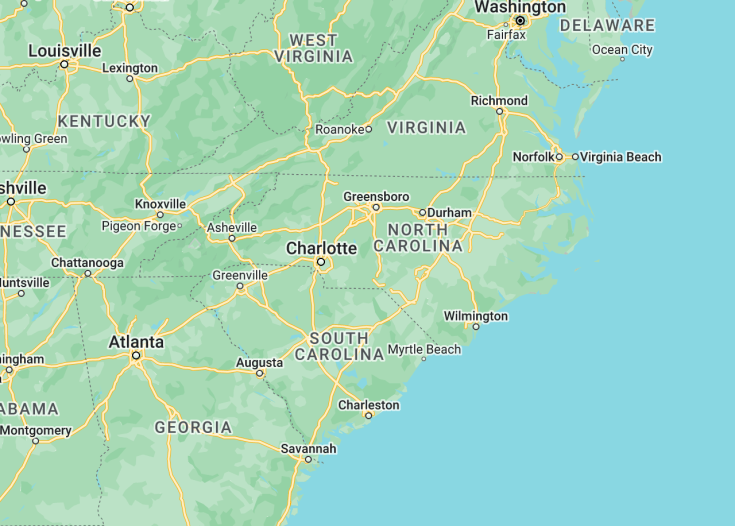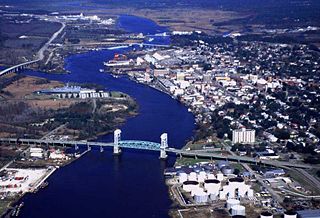Known for its stunning landscapes and rich history, North Carolina is a diverse and captivating destination. With its picturesque mountains, beautiful coastlines, and charming cities, the state offers something for everyone. Explore the breathtaking Blue Ridge Mountains, relax on the pristine beaches of the Outer Banks, or delve into the fascinating history of colonial towns like Wilmington. Whether you’re a nature lover, history buff, or simply seeking a relaxing getaway, North Carolina is the perfect place to visit.
Experience the beauty of the Blue Ridge Mountains with a hike along the Appalachian Trail.
Don’t miss the chance to try some famous North Carolina barbecue while you’re in the state.
Top destinations in North Carolina (USA)
North Carolina (USA): a charming blend of nature and history.
| Capital | Raleigh |
| Time in North Carolina | GMT-4 |
| Language spoken | English |
| Population | 10.49 million (United Nations, 2021) |
| Religion | Christianity (77.6%) No religion (18.6%) Other religions (3.8%) |
| Currency | United States Dollar (USD) |
| Airports | Charlotte Douglas International Airport Raleigh-Durham International Airport |
North Carolina, located on the east coast of the United States, is a destination that offers a delightful mix of natural beauty and rich history. With its stunning landscapes, vibrant cities, and charming small towns, this state has something to offer every type of traveler.
Where is North Carolina located?
Nestled between the Atlantic Ocean and the Appalachian Mountains, North Carolina is situated in the southeastern region of the United States. It shares borders with Virginia to the north, Tennessee to the west, and South Carolina and Georgia to the south.
What is North Carolina famous for?
North Carolina is renowned for its beautiful coastline, which stretches for over 300 miles, making it a popular destination for beach lovers. The state is also known for its rich history, having played a significant role in the American Revolution and the Civil War. Moreover, North Carolina is home to the scenic Blue Ridge Mountains, offering breathtaking views and countless outdoor recreational opportunities.
History
The history of North Carolina (USA) dates back thousands of years to the Native American tribes that first inhabited the region. The first European explorers arrived in the 16th century, with Spain claiming the territory as part of its colonial empire. However, it was not until the late 17th century that English settlers established permanent colonies in North Carolina.
In the early colonial period, North Carolina was known for its agricultural economy, based primarily on tobacco and rice plantations. The colony also played a significant role in the American Revolution, with several key battles taking place on its soil.
1776-1860: Colonial and Antebellum Period
During the colonial and antebellum period, North Carolina continued to rely on agriculture as its primary economic activity. The state was known for its production of cotton, tobacco, and naval stores. Slavery was an integral part of the economy, with a significant African American population living in bondage.
In 1861, North Carolina seceded from the Union and joined the Confederacy during the American Civil War. The state was the site of numerous battles, including the Battle of Gettysburg. After the war, North Carolina underwent a period of Reconstruction and faced challenges in rebuilding its economy.
1861-1945: Industrialization and World Wars
In the late 19th century, North Carolina experienced significant industrial growth, particularly in textile manufacturing. The rise of the textile industry fueled urbanization and the development of cities such as Charlotte, Greensboro, and Winston-Salem.
North Carolina played a crucial role in both World War I and World War II. The state contributed soldiers, supplies, and industrial production to the war effort. Military installations were established, including Fort Bragg and Camp Lejeune.
1945-present: Modern Era
After World War II, North Carolina continued to experience economic and population growth. The state diversified its industries and became a center for technology, research, and finance. The Research Triangle Park, located between Raleigh, Durham, and Chapel Hill, emerged as a hub for innovation and entrepreneurship.
Today, North Carolina is known for its vibrant culture, scenic beauty, and thriving tourism industry. The state offers a diverse range of attractions, including the stunning Blue Ridge Mountains, beautiful beaches along the Outer Banks, historic sites, and cultural festivals.
Visit North Carolina (USA)
What to see and do in North Carolina (USA)
When visiting North Carolina (USA), there are plenty of attractions and activities to keep you entertained. Here are some must-see destinations:
- The Blue Ridge Parkway: Take a scenic drive along this iconic highway, showcasing breathtaking mountain views and stunning fall foliage.
- The Biltmore Estate: Explore the largest privately-owned house in the United States, featuring magnificent gardens, a winery, and historic exhibits.
- The Outer Banks: Relax on the beautiful beaches, visit the historic lighthouses, and try your hand at fishing or water sports.
- The Great Smoky Mountains National Park: Hike through the scenic trails and discover the diverse wildlife and stunning waterfalls.
- The North Carolina Museum of Art: Admire a vast collection of American and European art spanning centuries.
These are just a few of the many attractions that North Carolina has to offer. Whether you enjoy outdoor adventures, history, or cultural experiences, there is something for everyone in this diverse state.
Events in North Carolina (USA)
North Carolina hosts a variety of events throughout the year, showcasing the state’s rich culture and heritage. Some of the notable events include:
- The North Carolina State Fair (October): Experience a traditional state fair with livestock exhibits, live music, carnival rides, and delicious food.
- The Azalea Festival in Wilmington (April): Celebrate the blooming azaleas with a parade, garden tours, concerts, and arts and crafts exhibitions.
- The Carolina Renaissance Festival (October-November): Step back in time and enjoy jousting tournaments, live entertainment, crafts, and delicious medieval food.
- The Biltmore Blooms Festival (April-May): Explore the beautifully landscaped gardens of the Biltmore Estate and enjoy the vibrant spring blooms.
These events and many more offer a glimpse into the unique traditions and cultural heritage of North Carolina.
Best time to visit North Carolina (USA)
The best time to visit North Carolina (USA) largely depends on your interests and preferred activities. If you enjoy outdoor adventures and scenic beauty, the fall season (September to November) is ideal. The Blue Ridge Mountains offer stunning foliage colors, and the weather is pleasant for hiking and exploring.
For beach lovers, the summer months (June to August) are perfect for enjoying the coastal areas of the Outer Banks and other beach destinations. The warmer temperatures allow for swimming, sunbathing, and water sports.
If you’re interested in experiencing North Carolina’s cultural events and festivals, spring and early summer (April to June) offer a range of options. From the Azalea Festival to the Biltmore Blooms Festival, you can immerse yourself in the state’s vibrant traditions.
Overall, North Carolina has something to offer year-round, so choose the season that aligns with your preferences and interests.
Is North Carolina (USA) worth visiting?
North Carolina (USA) is definitely worth visiting for its rich history, natural beauty, and diverse range of attractions. The state offers a unique blend of scenic landscapes, vibrant cities, and cultural experiences.
The Blue Ridge Mountains provide a tranquil escape with breathtaking views and hiking trails. The coastal areas offer pristine beaches and charming seaside towns. Additionally, North Carolina is home to historic sites, such as the Biltmore Estate and various lighthouses, which showcase the state’s heritage.
Furthermore, the state’s cultural events and festivals celebrate its rich traditions and provide opportunities for immersive experiences. Whether you’re interested in art, music, or food, North Carolina has something to offer.
However, it’s worth noting that like any destination, North Carolina has its own unique charm and may not appeal to every traveler. It’s important to consider your personal preferences and interests when deciding whether to visit. Overall, North Carolina’s natural beauty, historical significance, and cultural offerings make it a worthwhile destination for many tourists.














